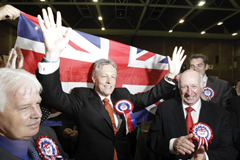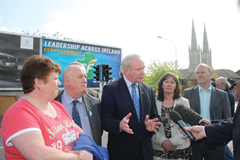Election campaign summary
 Peter Cheney sums up the campaign, results and trends.
Peter Cheney sums up the campaign, results and trends.
In the absence of spectacular changes, the election’s main stories were Northern Ireland’s lowest post-war turnout and the murder of Constable Ronan Kerr, a brutal reminder of the remaining threat from terrorism.
Nuala Kerr’s hope that her son should not die in vain was reinforced by her family’s statement on 4 May, calling for people to vote as a protest against violence. A slight majority (55.6 per cent) did turn out but the non-voting bloc poses a major problem for the new Assembly.
Incoming MLAs will govern an electorate which is increasingly disillusioned with politics. Indeed, Stormont was the last thing on most voters’ minds over the royal wedding, Easter and May bank holidays.
Sinn Féin hoped for a bounce from its success in the Republic while Alliance sought the same effect from its Westminster win. Internal rows damaged the UUP at the start. The SDLP’s approach was strong on detail but lacked energy, while the DUP were relaxed and confident. Peter Robinson showed his humorous side on twitter, including the fall into his fish tank.
McGuinness and Robinson appeared at ease with each other during the leaders’ debates, except when irked by claims of ‘Peteritis’ or the allegation (fiercely denied) that the First Minister praised Caitríona Ruane.
Performances
For the DUP and Robinson in particular, this was the comeback poll. Its voting share dipped slightly on 2007, due to a lower turnout, and the party’s seats hit a new high water mark of 38. As before, all candidates were pledged to follow the party line if elected.
Sinn Féin fell just short of the 30 votes needed for petitions of concern, and basically held on to its share of support with some local progress in Fermanagh and South Tyrone and East Antrim. It now has 46 representatives in Stormont and Leinster House.
The UUP was left with no Assembly voice in Foyle (by default) or North and West Belfast. Tom Elliott was widely criticised for his “scum of Sinn Féin” remarks. Ulster Unionists performed best in Fermanagh and South Tyrone, Upper Bann and Strangford. The party was outpolled by David McClarty in East Londonderry, only to unsuccessfully seek his support to keep two ministers in the Executive.
There are now no SDLP MLAs in County Antrim (outside Belfast) and Fermanagh and South Tyrone. It basically held its ground in Derry, South Down and South Belfast.
Both parties dropped under the 100,000 mark for the first time in an Assembly poll, losing two seats a-piece but regaining representation in West Tyrone.
Alliance was boosted by nearly 15,000 new voters and strengthened its footing in East Belfast. The cross-community party overtook the SDLP and UUP in the greater Belfast area. However, the DUP is back on form and determined to reverse Peter Robinson’s loss.
Steven Agnew narrowly held on to the Green seat in North Down, on the 11th count. The party’s support has halved since 2007. An ever-upbeat Brian Ervine and his PUP team cheered as they picked up doubtful votes at the East Belfast count but neither he nor Dawn Purvis crossed the line.
Loyalism is now unrepresented at Stormont for the first time since 1998, a development which is likely to give paramilitaries greater influence. The TUV’s fury at the Executive was clearly not widely shared. A mainly negative campaign yielded 16,480 votes (the core ‘no surrender’ group) and a single seat.
The Electoral Office was strongly criticised for slow counting with William Hay calling for a better system. The NIO has pledged to help speed up the process. Chief Electoral Officer Graham Shields emphasised that accuracy was more important than speed and his staff pointed out in advance that it could take two days.
A political system designed so that ‘all must have prizes’ undoubtedly contributed to apathy. Unlike in other countries, notably the Republic, it was virtually certain that the same parties would be returned to power. Voters sensed that they were getting more of the same.
The 108-member Assembly with mandatory coalition does guarantee a full range of views, as far apart as Jim Allister and Sean Lynch, but keeping rigidly to the Good Friday Agreement (now 13 years old) also has clear flaws.
Consensus rules over criticism. In contrast, Scottish policy debates are frank, lively and frequently partisan. With all the main parties in government, the UUP and SDLP will also play up to their role as an internal opposition, which breaks collective responsibility and appears contradictory.
The Agreement was not set in stone and the forthcoming institutional review will allow the parties to consider changes to the system of government, the number of MLAs and the scope for a formal opposition. Ministers, though, also need to prove that they can complete the stalled reforms in education and local government.
While the last Programme for Government prioritised the economy, much of the parties’ time was taken up by politics. The last Assembly often appeared absorbed in its own problems while voters’ economic woes got worse.
Invest NI helped to create 20,286 new jobs over the course of the Assembly, including an impressive 10,981 from inward investment, but unemployment escalated from 28,000 to 62,000. The Executive failed to meet for five months in 2008, as the recession took hold, and 350 manufacturing jobs were lost as the parties discussed the mechanics of devolving justice inside Hillsborough Castle.
The general public has little appetite for the differences between d’Hondt and cross-community votes, mandatory and voluntary coalition, or capital and resource spending. However, the processes of government will ultimately affect their everyday lives, particularly through the Budget.
Many people are disillusioned with the system but not necessarily politics itself. Plenty of radio listeners take their cases to the Stephen Nolan show.
Cynicism grew after the Westminster expenses scandal. Turnout was subsequently 42.8 per cent in the 2009 European poll and 57.6 per cent last year. Back in 1998, the referendum brought out 81.1 per cent of the electorate.
No province-wide elections are now scheduled until the June 2014 European poll, with the general election due to follow in June 2015. That gives the Assembly the breathing space to reform and deliver.
| Party | First preferences | % vote | Seats |
| DUP | 198,436 | 30.0 | 38 |
| Sinn Féin | 178,224 | 26.9 | 29 |
| UUP | 87,531 | 13.2 | 16 |
| SDLP | 94,286 | 14.2 | 14 |
| Alliance | 50,875 | 7.7 | 8 |
| TUV | 16,480 | 2.5 | 1 |
| Green | 6,031 | 0.9 | 1 |
| Others | 29,890 | 4.6 | 1 |






